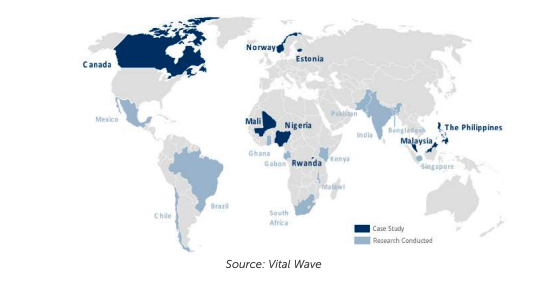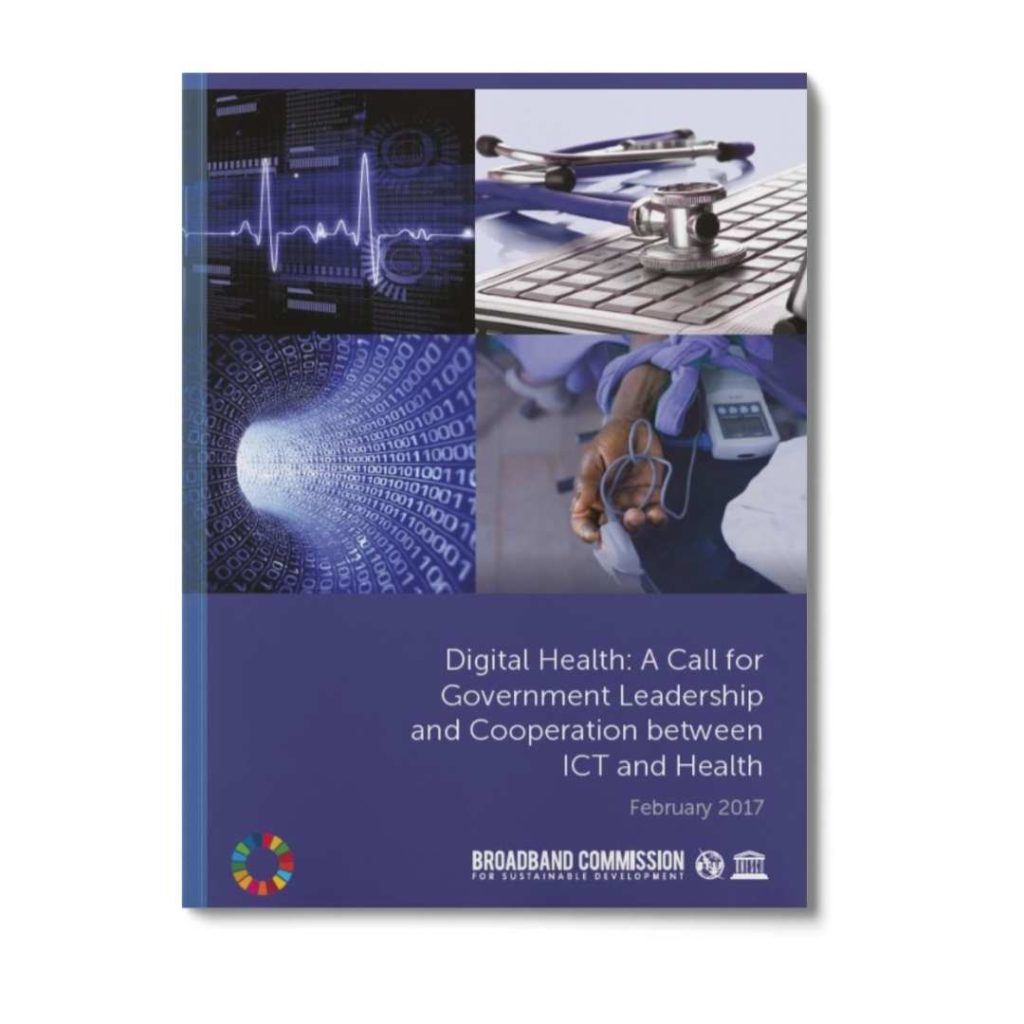How can ICTs help enable universal health coverage?
The Broadband Commission for Sustainable Development’s 2017 Working Group on Digital Health was tasked with identifying countries that have successfully integrated health information systems, ICT infrastructure, and health ICT applications, to showcase best practices and tools for other countries. Co-Chaired by Dr. Ann Aerts, Head of the Novartis Foundation, and Mr. Rajeev Suri, President and CEO of Nokia, this group examined seven case studies and provided actionable recommendations for developing and implementing a successful national health strategy.
Setting the Stage
Background Overview
Digital health and eHealth (used interchangeably) are umbrella terms to encompass all concepts and activities at the intersection of health and information and communications technologies (ICTs), including mobile health (mHealth), health information technology, electronic health records (EHRs), and telehealth.
Since the beginning of the millennium, great progress has been made in reducing maternal and child mortality and infectious diseases such as HIV/AIDS. Yet low- and middle-income countries (LMICs) now not only face the threat of new diseases and epidemics, but also the rising tide of non-communicable diseases which are wreaking a heavy toll on countries with health systems ill-prepared to face these threats.
Pressures on global health systems are compounded by the escalating costs of delivering healthcare and the lack of sufficient financial resources to meet these. As national leaders strive to reach the ambitious health-related targets of the Sustainable Development Goals (SDGs), they are realizing how ICTs can support health systems to cope with their growing disease and cost burdens.
The Way Forward
Conclusions and Recommendations
The Working Group’s 2017 report, titled Digital Health: A Call for Government Leadership and Cooperation between ICT and Health, identified three potential governance mechanisms that could guide the implementation of a national digital health strategy, each presenting advantages and drawbacks.
The report’s country case studies give examples of governance mechanisms and describe the elements needed to implement national digital health strategies across a variety of geographical and resource settings.
Country Case Studies

The seven countries examined in the Working Group’s 2017 report include: Nigeria, the Philippines, Malaysia, Estonia, Norway, Canada, and Mali. Each of these countries showed that success in implementing a national health strategy depends on the presence of committed senior government leaders, on effective governance mechanisms to facilitate coordination among stakeholders, and on a national ICT framework which promotes alignment between stakeholders in both the health sector and the ICT sector. Illustrated by real-world experiences and lessons learned, the insights and findings of the report provide leaders with an understanding of the steps and elements needed to achieve these three conditions.
As evidenced by the case studies in this report, the catalyst for developing a national digital health strategy may be different in each country. In Rwanda, Malaysia and Canada the impetus for digital health efforts came from ambitious national ICT or broadband plans. In some cases, these broadband plans came from even wider economic development plans, such as Rwanda’s Vision 2020 or Malaysia’s Plan for Social and Economic Transformation. In Nigeria and the Philippines, leaders committed to the notion that ICT could accelerate their UHC goal.
The larger strategic recommendations of this Working Group’s report call for:
Initiating and operationalizing a national digital health strategy can take several years, implying a long-term commitment. A strong vision supported by senior government leadership that can articulate the value and potential impact of digital health and ensure the buy-in and alignment of stakeholders is required. Endorsement and leadership across sectors are needed, both from health leaders who recognize the transformative potential of ICTs in healthcare and from ICT leaders who understand the potential of digital technology to address health challenges. Commitment from those leaders can consolidate sustainable financial support and the resources for a digital health strategy.
Governance mechanisms formalize decision-making and provide a forum for discussion. They bring together leaders and stakeholders from overlapping domains. They clarify how and when external stakeholders, from the private sector or the development community, can provide input, and they promote the drafting of a digital health strategy by creating management units. In developing the strategy, clarifying and codifying organizational roles can be used as a basis for governance structures and domain ownership.
Digital health lies at the intersection of health and ICT. A strong governmentwide ICT framework will enable shared capital investments, rationalized resource allocations, and leveraged workforce capabilities between government entities, while at the same time avoiding duplication of solutions. Coupling digital health efforts to national ICT frameworks, such as national broadband plans or national digital plans, can enhance cooperation.
- The single greatest success factor is having a strong regional or country champion. Leadership is one element that can make or break electronic health information systems.
The Working Group Model
Composition and Activities
- ITU
- UNESCO
- Dr. Sam Pitroda
- IADB
- Prof. Jeffrey Sachs SDSN/ Columbia
- KT
- IMDA Singapore
- Bharti
- Intel
- Microsoft
- Huawei
- GSMA
- Government of Rwanda
- The World Bank
- WHO
- Ms. Florence Gaudry Perkins – Digital Health Partnerships
- mPowering Frontline Health Workers
- Alvin Marcelo
- Norad
- PATH
- Dimagi
- Richard Gakuba
- David Novillo Ortiz, PAHO
The Working Group on Health was proposed during the 12th meeting of the Commission held on September 26, 2015. The group held 2 physical meetings in Dubai (March 2016) and in Geneva (May 2016) as well as several virtual conferences and an onsite panel session at the Global Digital Health Forum 2016 on 13 December 2016 to to present preview of the joint report on “Digital Health: A Call for Leadership and Cooperation between ICT and Health”, which is to be released in early 2017.
Focus Area
Outcome Resources
Co-Chairs
Dr. Ann Aerts
Head, the Novartis Foundation
Mr. Rajeev Suri
CEO of Nokia
Broadband Advocacy Targets
SDGs







